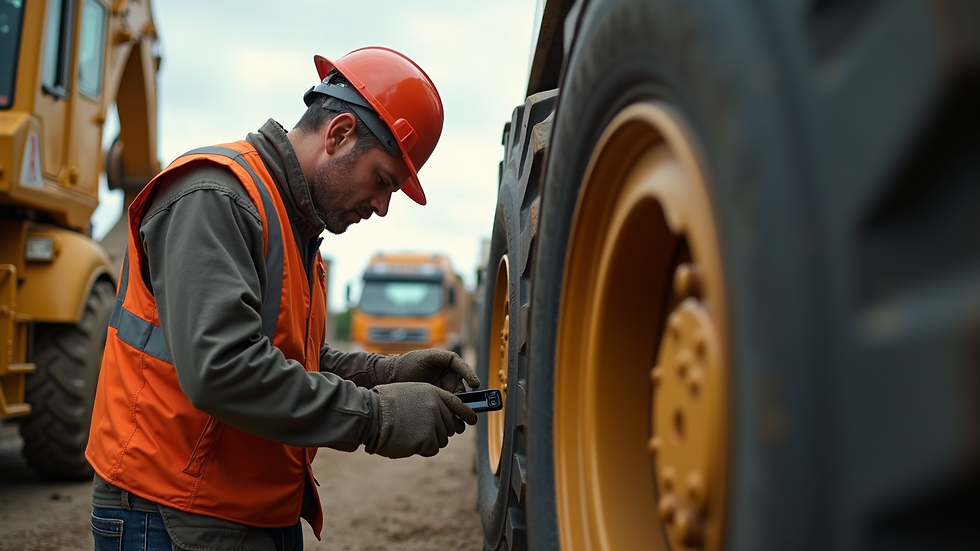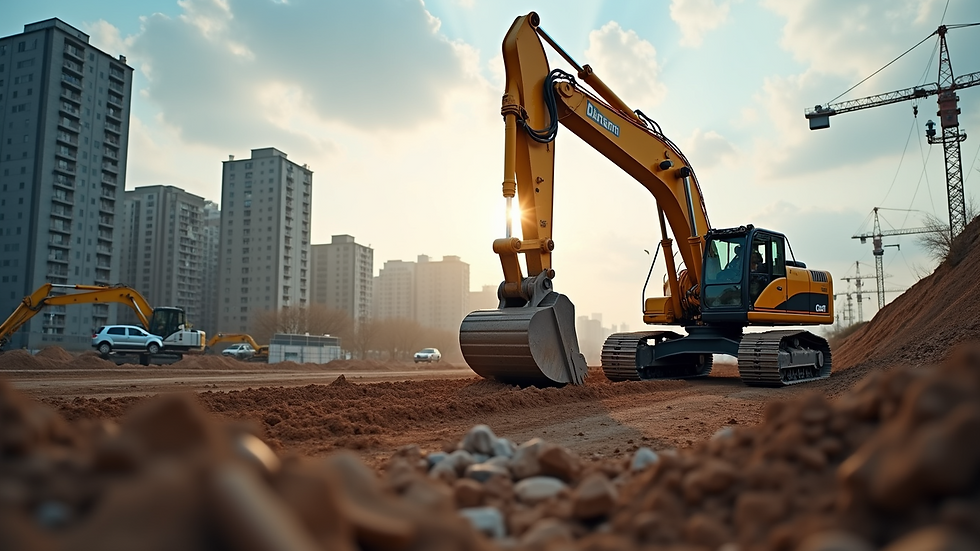Expert Tips for Choosing Construction Equipment
- williammiller88
- Aug 14, 2025
- 5 min read
Choosing the right construction equipment can make or break a project. Whether you are a seasoned contractor or a DIY enthusiast, understanding what to look for is crucial. The right tools not only enhance productivity but also ensure safety and efficiency on the job site. In this post, we will explore expert tips to help you make informed decisions when selecting construction equipment.
Understand Your Project Requirements
Before you even think about equipment, take a moment to assess your project. What are the specific tasks you need to accomplish?
Type of Work: Are you doing excavation, demolition, or building? Each task requires different equipment.
Site Conditions: Consider the terrain. Is it rocky, muddy, or flat? The conditions will influence your equipment choice.
Project Size: Larger projects may require heavy machinery, while smaller jobs can often be handled with lighter tools.
By clearly defining your project requirements, you can narrow down your options and focus on what you truly need.
Research Equipment Options
Once you know what you need, it’s time to research.
Brand Reputation: Look for brands known for reliability and durability. Brands like Caterpillar, John Deere, and Bobcat have established themselves in the industry.
Equipment Features: Different models come with various features. For example, some excavators have advanced hydraulic systems that improve efficiency.
User Reviews: Check online reviews and forums. Real-world experiences can provide insights that specifications alone cannot.
Taking the time to research will help you make a more informed decision.
Consider Equipment Size and Weight
The size and weight of the equipment are critical factors.
Transportability: Can you easily transport the equipment to your job site? Larger machines may require special transport arrangements.
Site Accessibility: Ensure that the equipment can maneuver around your site. Tight spaces may limit your options.
Weight Limits: Be aware of weight limits on your site, especially if you are working on a structure that cannot support heavy machinery.
Choosing the right size and weight will save you time and potential headaches later on.
Evaluate Safety Features
Safety should always be a top priority when selecting construction equipment.
Safety Ratings: Look for equipment that meets safety standards. This can include features like rollover protection and emergency shut-off systems.
Operator Comfort: Equipment that is comfortable to operate can reduce fatigue and improve focus. Look for adjustable seats and easy-to-reach controls.
Training Requirements: Some equipment may require special training to operate safely. Factor this into your decision-making process.
Investing in safety features not only protects your workers but also minimizes liability.
Assess Maintenance and Support
Every piece of equipment will require maintenance.
Maintenance Schedule: Understand the maintenance needs of the equipment. Some machines may require more frequent servicing than others.
Parts Availability: Ensure that replacement parts are readily available. This can save you time and money in the long run.
Manufacturer Support: Check if the manufacturer offers support services. A good warranty and customer service can make a significant difference.
By considering maintenance and support, you can avoid unexpected downtime and costs.
Budget Wisely
Budgeting is a crucial aspect of any construction project.
Initial Costs: Determine how much you can afford to spend on equipment. This includes purchase price, rental fees, and any additional costs.
Long-Term Costs: Consider the long-term costs of ownership, including maintenance, fuel, and insurance.
Financing Options: Explore financing options if you need to spread out the costs. Many equipment dealers offer financing plans.
Being mindful of your budget will help you make choices that align with your financial goals.
Explore Rental vs. Purchase
Deciding whether to rent or purchase equipment can significantly impact your project.
Short-Term Projects: If your project is short-term, renting may be the best option. It allows you to access high-quality equipment without the long-term commitment.
Long-Term Use: For ongoing projects, purchasing equipment may be more cost-effective. You can also customize it to fit your specific needs.
Rental Agreements: If you choose to rent, read the rental agreement carefully. Understand the terms, including insurance and liability.
Weighing the pros and cons of renting versus purchasing will help you make the best decision for your situation.
Seek Expert Advice
Don’t hesitate to seek advice from experts in the field.
Consult with Peers: Talk to other contractors or construction professionals. They can provide valuable insights based on their experiences.
Visit Equipment Dealers: Equipment dealers often have knowledgeable staff who can help you understand your options.
Attend Trade Shows: Trade shows are a great way to see equipment in action and ask questions directly to manufacturers.
Getting expert advice can provide you with perspectives you may not have considered.
Test Equipment Before Committing
Whenever possible, test the equipment before making a commitment.
Demo Days: Many dealers offer demo days where you can try out equipment. Take advantage of these opportunities.
Hands-On Experience: Operating the equipment yourself can give you a feel for its capabilities and limitations.
Ask Questions: While testing, don’t hesitate to ask the dealer questions about performance and features.
Testing equipment can help you avoid costly mistakes and ensure you are making the right choice.
Keep Up with Industry Trends
The construction industry is constantly evolving.
New Technologies: Stay informed about new technologies that can improve efficiency and safety. For example, telematics can help monitor equipment performance.
Sustainability Practices: Consider equipment that is more environmentally friendly. This can include fuel-efficient machines or those that use alternative energy sources.
Regulatory Changes: Be aware of any changes in regulations that may affect your equipment choices.
Keeping up with industry trends will help you stay competitive and informed.
Build Relationships with Suppliers
Building strong relationships with your equipment suppliers can be beneficial.
Trustworthy Partnerships: A reliable supplier can provide you with quality equipment and support.
Negotiation Power: Having a good relationship may give you leverage when negotiating prices or terms.
Access to New Equipment: Suppliers often have the latest equipment available, giving you access to cutting-edge technology.
Investing time in building these relationships can pay off in the long run.
Make a Decision and Take Action
After considering all these factors, it’s time to make a decision.
Weigh Your Options: Review all the information you have gathered and weigh your options carefully.
Trust Your Instincts: Sometimes, your gut feeling can guide you in the right direction.
Take Action: Once you have made your choice, take action. Whether it’s renting or purchasing, move forward with confidence.
Making a well-informed decision will set you up for success on your project.
Final Thoughts
Choosing the right construction equipment is a vital step in ensuring the success of your project. By understanding your requirements, researching options, and considering safety and budget, you can make informed choices that will benefit you in the long run.
Remember, the right equipment not only enhances productivity but also contributes to a safer work environment. Take your time, do your homework, and you will find the perfect tools for your construction needs.



Comments